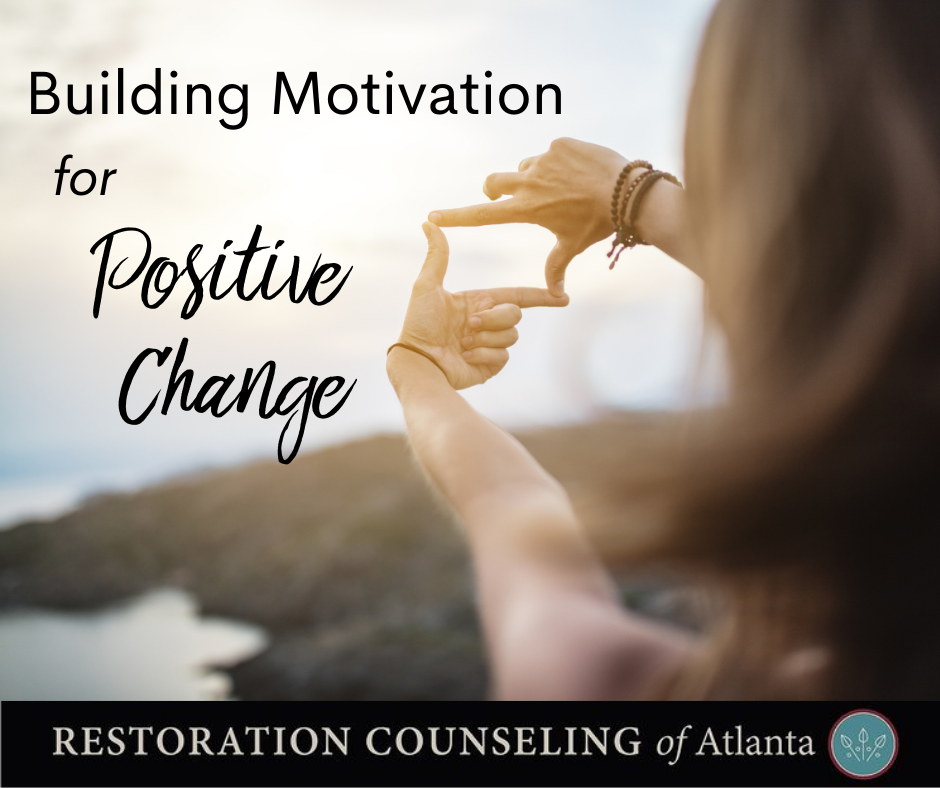When it comes to getting results, it takes motivation and ability. But as the pandemic has lingered and limited so much of our normal life, more and more clients are talking about their loss of motivation to do. Not just the un-fun things in life, but also the things they used to enjoy or feel passionate about. This can lead to anxiety as worry sets in over why this is happening or depression as life begins to feel like a grind.
Aristotle had an idea about how to fix it: “First, have a definite, clear, practical ideal; a goal, an objective. Second, develop the necessary means to achieve your ends – wisdom, patience, materials, and methods. Third, adjust all your means to that end.”
So that is good news- motivation can be learned, rediscovered, and nurtured! That’s not to say it’s easy because it will require attention and focus, but there is a path to rediscovering excitement for life goals, whether those are improving performance in school/job, sports, or hobbies; pursuing better health or changing jobs; saving for something big like a car or vacation; or even scratching something off the bucket list.
Here are some steps to get you moving again.
Get in touch with your values, strengths, and gifts.
Connecting your actions to your values, even in small ways, will influence your drive and moves you toward the change you want.
Identify your interests, talents, and gifts that have brought success in the past to understand your strengths and how to use them best.
This builds self-confidence and resilience to step outside your comfort zone when self-doubt creeps in.
Find your purpose through goal setting.
Some call this “Finding your WHY.” Just be sure your “why” lines up with your values!
Goals give you purpose. Purpose clarifies priorities. Priorities direct focus and motivation.
Goals also promote a growth mindset, improve self-image, encourage a sense of control, boost your mood, and help you manage impulsivity and temptation.
Be sure to set SMART goals: Specific, Measurable, Achievable, Realistic/Relevant, and Timely.
Write down your goals and find support and accountability in someone you trust.
Find your inner compass.
Develop discrepancy by evaluating what you are doing that steals motivation or leads you away from your goals and ask yourself what you really want for yourself in the long-term? Make an honest appraisal of your lack of motivation, not for self-criticism but to identify the hurdles you have to jump to accomplish your goals and build internal motivation.
This includes addressing the reasons for giving into temptation or procrastination! Do not judge yourself but roll with this resistance by accepting yourself and your lack of motivation. Understand that there are valid reasons for these feelings, and don’t label them as lazy or incompetent. Instead, label them as resistance and remind yourself that giving in to them postpones achieving your goals.
Tell yourself, “I can do hard things!” Challenge self-doubting thoughts and feelings, which will bolster your image as capable, positive, and resilient.
Know you will succeed when you put in the effort.
Remember the feeling.
When you feel good, you find motivation faster, so get in touch with good feelings.
Remember the feeling of past achievements and successes. How did you feel when you rode a bike without training wheels for the first time?
Remember feeling happy and content. What about feeling the warm sun on your skin on a sunny day? Smelling your favorite smell? Seeing someone you love smile because of something you did? Eating your favorite food? Listening to your favorite music? Nobody said you can’t do these things right now if you need to reignite good feelings from happy memories!
Shift your focus to the past, present, or future.
Sometimes you have to be here, now, but sometimes, the right here right now is a nasty present to be in. The beauty of shifting tense is you can visualize a more compelling future or remember a more enjoyable past.
At the same time, if you catch yourself dwelling on a painful past, get back to right here, right now, and find the joy in the moment.
Your brain will respond to happier memories or visualizations with a rush of endorphins, making you feel better. So do some mental vacationing!! (This skill improves with practice!)
“CHOOSE” to.
If you tell yourself you “HAVE” to do this or you “MUST” do that or you “SHOULD” do this, you can weaken your motivation.
The power of choice and simply reframing your language to “CHOOSE” to can be incredibly empowering and exactly the motivating language you need to hear. Choose the words of your internal dialogue carefully and make them work for you.
Change your question.
Sometimes you need to change your focus. To change your focus, change the question.
If you ask yourself what’s wrong with this situation, of course, you’ll find things to complain about. Ask yourself what’s right about the situation, and you can quickly find the positives and get back in your groove.
Value rest, play, fun, and life balance.
As the saying goes, “All work and no play makes Jack a dull, dull boy,” but it also makes Jack a very anxious, depressed, and unmotivated boy! So it’s important to find a way to enjoy the journey of getting from where you are to where you want to be.
Socialize: Maybe fun means partnering with a friend to hold each other accountable for goals. Make sure you pair up with somebody who complements your skill, who really understands you, or who can mentor you and get you over the humps.
Self-care: Build time into your schedule for restoration and refreshment. Do things you love. Explore and evolve your interests outside your comfort zone.
Health: Find a routine for eating, sleeping, and moving your body/working out that supports you to ensure your body or emotions are not working against you because you’re not giving them a break or fueling them the right way.
Rewards: Allow yourself rewards at each step of achievement. There’s nothing wrong with a little self-indulgence, especially when you’ve been working so hard toward a goal! Use this time to reflect on how far you’ve already come, and you’ll find you want to keep going.
Having a balance in your life will feed the mind, body, and spirit, making you feel good. And feeling good encourages motivation.
Take action.
Leonardo da Vinci defines the problem of motivation this way: “I have been impressed with the urgency of doing. Knowing is not enough; we must apply. Being willing is not enough; we must do.”
Here’s a secret:
You cannot motivate yourself to action. Instead, act yourself into motivation.
You cannot trust motivation to help you achieve success, but you CAN trust self-discipline. You can trust your own consistent actions. Self-discipline is that thing that makes you show up every day — even when you don’t feel like it. This part is key. It’s a commitment. It’s a decision.
Successful people show up every single day, and they take action — even if they have no motivation at all.
It all starts with showing up.
It’s not a one-time thing, though. You have to do “the thing” to get results. And you must do it at least most of the time if every single day isn’t feasible.
As Nike said, “Just do it!” Simply start doing an activity, and your motivation will kick in. Maybe not immediately, so you must be disciplined to stay at it, knowing you will move in a positive direction!
At the end of the day, all motivation really comes down to self-motivation, and you get better at motivation by growing your self-awareness. Learn how to push your own buttons from the inside out. Seek progress, not perfection, and let motivation develop into a positive cycle of change that leads you toward your goals.
It CAN be done. Just take the first step.
 by Paige Santmyer, MA NCC APC CCATP
by Paige Santmyer, MA NCC APC CCATP
Roswell location
paige@restorationcounselingatl.com, ext. 157
Paige provides a safe and comfortable atmosphere where clients can explore the challenges they are facing. She also believes in addressing the individual’s entire personhood, assessing needs in all domains of life instead of focusing solely on mental health needs. Paige works with adults and teens around depression, anxiety, mood disorders, relationship issues, trauma, PTSD, and life transitions.
References
Bartholomew, N. G., Dansereau, D. F., and Simpson, D. D. (September 2006). Getting Motivated to Change. TCU Institute of Behavioral Research. http://ibr.tcu.edu/wp-content/uploads/2013/09/TMA06Sept-mot.pdf
Honos-Webb, L. (October 2020). Six Super skills for executive functioning. New Harbinger Publications.
Meier, J. D. (March 18, 2016). Fifteen Ways to Motivate Yourself and Others. Sources of Insight. https://time.com/4262774/motivation-ways/
Pyle, C. (n.d.). Here’s Why You Can’t Motivate Yourself. Proofreadanywhere.com. https://proofreadanywhere.com/motivate-yourself/

